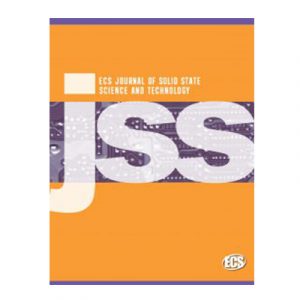
ECS recognizes the importance of expanding opportunities for publishing in ECS journals as the science continues to evolve. The Society recently made changes to the sensors topical interest area (TIA). Submissions to the ECS Journal of Solid State Science and Technology (JSS) are now accepted along with the Journal of The Electrochemical Society (JES).
“With the rapid growth experienced by the sensor community, and the gradual blurring of boundaries between solid state and electrochemical sensing strategies, it makes eminent sense to have a single TIA for this topic for both journals,” said Krishnan Rajeshwar, JSS Editor-in-Chief, and Robert Savinell, JES Editor-in-Chief.
Both aspects of the TIA are supported by the ECS Sensor Division.
Sensor (Electrochemical)
Areas of interest include sensors for the detection and discrimination of chemical and biological species, as well as sensor advances and new methods of measurements based on electrochemical principles. Specific areas include novel development, implementation, characterization, fundamentals, and applications of chemical and biological sensors, sensor arrays and sensor networks, including those based on inorganic, organic, and biological materials and their relevant interfaces. Transduction mechanisms include, but are not limited to, electrochemical, impedance, resistive, and capacitive. Specific topics include wearable devices, implantable devices, brain-computer interface, agricultural sensors, environmental sensors, robotic sensors, sensors for healthcare, microfluidics, nanofluidics, device fabrication, materials characterization, nanomaterials and nanostructures, sensing mechanisms, sensor arrays, miniature chemical analysis systems, lab-on-a-chip, artificial intelligence, and machine learning for sensor networks.
Sensor (Solid State)
Areas of interest include sensors or devices based on physical and quantum transduction principles, as well as sensor advances focused on solid state principles. Specific areas of interest include novel development, characterization, implementation, fundamentals, and applications of physical and quantum sensors. Transduction mechanisms of interest include, but are not limited to, quantum, mechanical, mass sensitive, optoelectronic, optical, radiation, thermal, acoustic, piezoelectric, resistive, microwave, and magnetic. Specific topics include wearable devices, implantable devices, brain-computer interface, agricultural sensors, environmental sensors, robotic sensors, sensors for healthcare, microfluidics, nanofluidics, device fabrication, materials characterization, nanomaterials and nanostructures, sensing mechanisms, sensor arrays, wireless sensors, and internet of things, artificial intelligence, and machine learning for sensor networks. Also of interest are applications of 3D and 4D printing, microelectromechanical or nanoelectromechanical system technologies including micro/nanomachining, fabrication processes, nanocomposites, hybrid materials, packaging, and the use of these structures and processes for the miniaturization of physical sensors and other devices.


